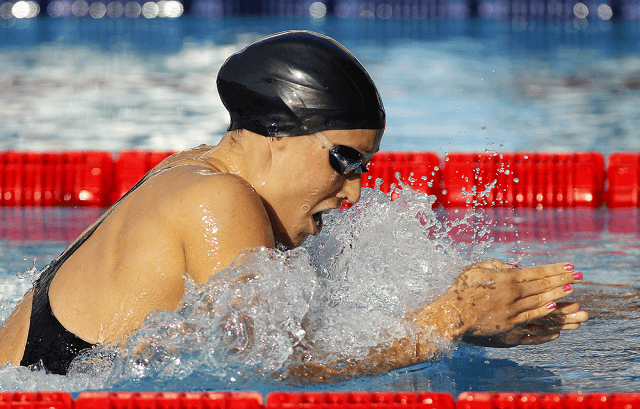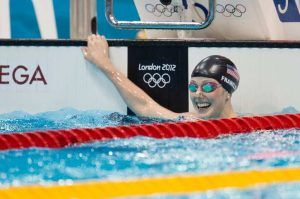We all have those mornings when we pretend we don’t hear the alarm clock go off. Or we conjure a long and detailed list of potential excuses we can issue to get out of the main set. Maybe the lack of progress towards our long term goals has us dizzy with stress and panic, to the point that quitting seems like the only viable option. Perhaps we are neck deep in stress from our significant other, school work, or the demands of work and family are pulling us in a zillion different directions.
In the midst of those situations the last thing we want to do is to suit up and head down to the pool and bang out a heavy mid-season set. The good news is this – not only does everyone else also have these days, but having these moments of overwhelming doubt, insecurity and abject stress are natural. Yup, it’s normal.
Here are 6 things to think about the next time you are about struggling with your desire to head back to the pool–
1. Learn to be okay with discomfort.
If life provided us with no discomfort, ever, it would be fantastic, wouldn’t it? Umm, nope. No discomfort = nothing worthwhile ever being achieved. If we did what our fleeting heart desired every second of the day we would live lives of bland, uninspiring dullness. The grind is part of the process, a necessary ingredient in your home-made batch of awesome. Accepting it, and realizing that it is simply part of the overall process means that you can stop fighting it, which burns up valuable energy and focus.
2. Commit to 5 minutes. Start small and commit to nothing more at first.
How many times have you gone to the pool, tired and achey, stressed out, and stared blankly at the set on the chalkboard with fatigued incredulity. To argue or to express disappointment at the daunting set ahead of you would simply require too much energy. But then you get in the water. Take a few strokes. Than take a few more. The cobwebs start to shake loose, blood starts to flow to your muscles, and you start getting into a rhythm in a few short minutes. Take things a couple minutes at a time, and no more.
3. Let go of your best case scenarios.
How often have you psyched yourself out because you felt there was no way you could live up to your desired or best-case result? If the fear of not achieving your best-case scenario was removed, you could focus on the process again, instead of busying yourself fretting over whether or not you are going to achieve the final result you want. This goes back to the previous point of taking things one step at a time; instead of placing focus and energy on results, zero in on only what is in front of you.
4. Stop thinking about your season end goals as one big thing.
This is our brain’s default way of thinking; it considers the goal as one, huge step. Thinking this way makes it so massive, so scary, so intimidating that we lock into the most comfortable thing that comes to mind – procrastinating. Your goals are achieved stroke-by-stroke, yard-by-yard, practice-by-practice. If the shadow of your season end goal seems to be never-ending, make a series of smaller, shorter goals. Instead of considering that massive goal time at the end, focus on the steps, one by one. This makes the process something a lot less intimidating, and by amassing a steady and consistent pile of small wins will you chip away at the big goal lurking in the corner.
5. Be mindful of feeling bad about feeling bad.
We expect ourselves to feel 100% ready to go, 100% of the time. This isn’t realistic. There are times where you are going to feel out of sorts no matter how much you sleep, how great you eat, or how much you warm-up. Beating yourself up over it won’t help you get back on track, and for many swimmers feeling crappy about feeling crappy compounds the initial problem (this point is the matryoshka doll of mental training skills). Accept that you feel off and give yourself some space mentally. Some days we will feel off, and this is okay. By embracing it, instead of fighting it at every turn – and getting frustrated and discouraged when you can’t get back to 100% soon enough – it slowly dissipates on its own.
6. Adopt a posture of gratitude.
This might feel a little contrived at first, but practicing genuine gratitude is one of the greatest additions you can make to your life. Numerous studies have shown that keeping a small gratitude journal (for example, a daily “5 things I am grateful for” checklist) increased long term health and happiness by 10%. By taking some time out of your day to remember what is important to you it helps to bring your energy and brain back into focus, and giving you an extra step the next time you head to the pool.
Take Your Swimming to the Next Level
YourSwimBook is a log book and goal setting guide designed specifically for competitive swimmers. It includes a ten month log book,
Learn 8 more reasons why this tool kicks butt now.
Join the YourSwimBook weekly newsletter and get motivational tips and more straight to your inbox. Sign up for free here.














